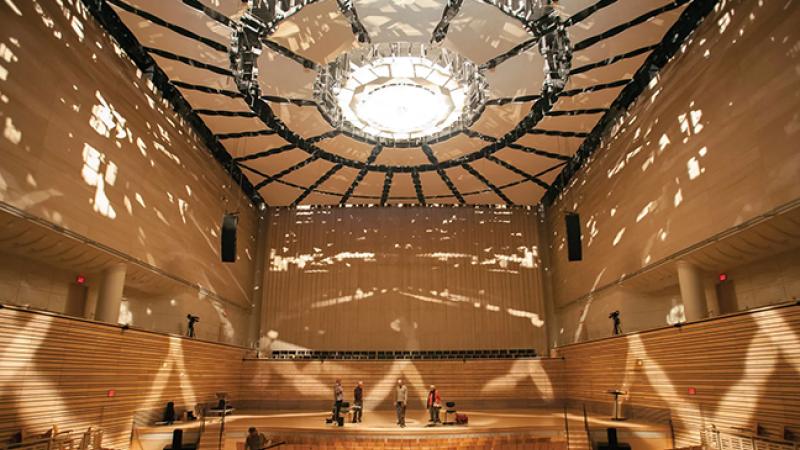Time Regained features a world premiere by former professor Pauline Oliveros and work by Terry Riley
October 8, 2024

Faculty, students, and alumni from the Arts Department at Rensselaer Polytechnic Institute will present Time Regained, a concert showcasing the partnership of Pauline Oliveros and Terry Riley through the lens of time-delay techniques, on Wednesday, November 6, at 4 p.m. in the Concert Hall of the Curtis R. Priem Experimental Media and Performing Arts Center (EMPAC).
The event is free and open to the public.
Pauline Oliveros was a composer, performer, and pioneer of live electronic music. As a professor at Rensselaer Polytechnic Institute from 2001 until her passing in 2016, she advanced her lifelong commitment to shaping technologies for enhancing human awareness and creative collaboration. In 2014 Oliveros established the Center for Deep Listening at Rensselaer to develop the philosophy and practice for which she is widely recognized. Oliveros’s Expanded Instrument System, originally a tape-based performance tool that she referred to as a “time machine,” represents an equally significant contribution to contemporary composition and performance methods. In her system, what is “expanded” is temporal: past, present, and future are experienced simultaneously, with transformations.
Oliveros’s The C(s) for Once, composed in 1966 but not publicly performed until now, is built around this technology, processing an instrumental and vocal ensemble with a three-unit tape-delay system controlled by a console operator following a precise series of instructions.
Composer/performer Terry Riley, sometimes referred to as the “founder of minimalism,” was a contemporary and sometimes collaborator of Oliveros. The program includes his Keyboard Study One (1965) and The Great Beauty (2016), which was composed in celebration of the life of Oliveros. The inclusion of Oliveros’ A Trilling Piece for Terry (2015) demonstrates that the inspiration and appreciation were mutual.
The program’s curator, Michael Century, professor of new media and music at RPI, has shaped the program to show how Oliveros’ ideas reach into both the future and the past. J.S. Bach’s “Modulating Canon,” from The Musical Offering (1747), is a masterful example of the classical counterpoint that Oliveros used as a touchstone. James Tenney’s For Twelve Strings (Rising) (1975) explores uncanny psychoacoustic effects first discovered at the Bell Laboratories in the mid-20th century that are the subject of continued research at RPI. With Sympoiesis (2024), a trio of live instrumentalists including Century will improvise a performance with Oliveros’ Expanded Instrument System as an homage and extension of her work.
“In an age of chronic interrupted attention, Oliveros’ beautiful vision and research program for expanding awareness through improvisational technologies remain as vital as ever,” said Century.
Time Regained will be performed by distinguished RPI faculty and alumni as well as the students of the Rensselaer Orchestra and Chamber Ensembles. For full program information, visit empac.rpi.edu.